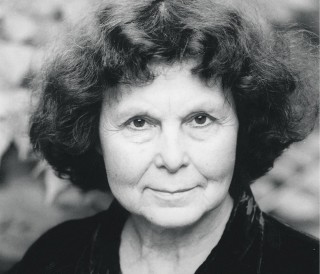Title

Sofia Gubaidulina
(Photo by Japan Art Association/The Saneki Shimbun)The New Juilliard Ensemble will mark the 85th birthday of Sofia Gubaidulina, one of today's most distinguished composers, with a concert on November 14. A central figure in the Soviet Union's small circle of unorthodox composers, Gubaidulina, like her now-famous modernist colleagues Arvo Pärt and Alfred Schnittke, was almost unknown in the West for many years, blocked from accepting invitations and access to leading publishers. So tight were the controls that in 1979, when Continuum—the ensemble that I direct with Cheryl Seltzer—wanted to present an evening of Soviet avant-garde music, we would have had to abandon the project had we not been connected with the wife of an American diplomat in Moscow, a woman who had arranged for the music of the Soviet modernists to be smuggled abroad.
Body
Gubaidulina's Introitus for piano and chamber orchestra was on the program for that pathbreaking concert, in January 1980. Then, for about five years, she had almost no performances in this country. Meanwhile, after the 1982 death of Leonid Brezhnev, then the head of the Soviet government, repression began to ease and more adventurous compositions became available. Dedicated performers such as violinist Gidon Kremer, the musicologist Laurel Fay, and publishers Sikorski (Hamburg) and G. Schirmer (New York) helped spread the avant-gardists' names. American interest in Gubaidulina was ignited by her selection as a finalist for the 1987 Grawemeyer Award. Two years after that, Continuum gave a full concert of her music at Alice Tully Hall. She returned for that although by then she had so many commissions that she wanted to avoid any other travels that season. Hearing that she had to limit her trips was astonishing considering that until a few years earlier, traveling abroad was next to impossible for her and most Soviets.
The centerpiece of that 1989 concert was the Western Hemisphere premiere of Perception (1983), a 55-minute cantata that Gubaidulina considers one of her major compositions. It resulted from her long and deep friendship with the Vienna-born poet Francisco Tanzer, a remarkable man who fled the Nazis, served in the United States Army, received his bachelor's from Hunter College, studied German literature at Columbia, returned to Europe in 1955, married a German woman, and made his home in Düsseldorf, where he ensured that his business activities did not curtail his writing. A long correspondence between Tanzer and Gubaidulina involved exchanges of poetry and music leading to this expansive German-language cantata. The words for one movement are by Gubaidulina herself; some passages are drawn from the Psalms. Love takes a special form in the climatic movement, which relates Tanzer's grief at having to put down his lamed racehorse.
Immediately after the 1989 performance, the director of the Santa Fe Chamber Music Festival asked me to conduct Perception there, even though the festival hardly ever used conductors. At the end of the first rehearsal, the players, powerfully moved, cancelled other commitments to allow extra rehearsals. In 2002 Continuum performed it again. Since then it has not been heard in New York.
Perception is now 33 years old and performing it is a fitting birthday tribute to Gubaidulina as it embodies her intense religiousness, her love of life and of love itself, and her remarkable sensitivity to the ways of music and the human heart. We deeply regret that she cannot attend our concert but happy that she is at home in Hamburg composing.
Perception is scored for female and male voices, seven strings, and prerecorded strings and voices. The soloists are recent alums Caitlin Redding, mezzo-soprano, and Leo Radosavljevic, baritone.
The concert begins with another tribute, Salvatore Sciarrino's Gesualdo Senza Parole (Gesualdo Without Words) written in 2013 for the 400th anniversary of the death of Don Carlo Gesualdo. Using eight instruments without voices, it elaborates upon four madrigals, retaining the originals while extending their sonic world. As the madrigals' texts dwell on aspects of love, it should be a suitably meditative prelude to Perception.




